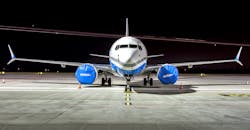737 MAX Schedule Moves Forward
The European Union's air-safety authority completed its test flights of the revamped Boeing 737 MAX aircraft, meaning the OEM is proceeding with its plan to return the narrow-body aircraft to commercial service. The European Aviation Safety Agency conducted three days to test flights on September 10 in Vancouver, British Columbia.
EASA's input and approval of 737 MAX design changes is considered to be an important step toward Boeing's plan to regain recertification for the aircraft and resume deliveries of the grounded jets during 2020.
“As the next step in its evaluation of the aircraft for return to service, EASA is now analyzing the data and other information gathered during the flights,” the EU agency stated. EASA's test flights follow those conducted the Federal Aviation Administration in June and Transport Canada in August.
Various safety-regulating authorities grounded the 737 MAX in March 2019 following a second fatal accident, both of which were attributed to the aircraft's flight-control software. The Maneuvering Characteristics Augmentation System (MCAS) prevented pilots from overriding a function designed to prevent engine stalling on takeoff — which accelerated the jets toward the ground.
Boeing halted deliveries of new 737 MAX jets at the same time as the grounding. During the following 17 months, Boeing has revised the MCAS and addressed some additional electrical wiring issues for the 737 MAX. The test flights are intended to validate the effectiveness of those revisions.
FAA is collaborating with EASA and other regulatory bodies as it works toward issuing a "Notice of Proposed Rulemaking (NPRM) for an Airworthiness Directive (AD)," which will include a summary of corrective actions required of operators before the jets may re-enter commercial service. FAA also plans a 45-days public-comment period for assessing the design and procedure changes developed to address the earlier design flaws.
Boeing has said it expects the regulatory approval in time to resume deliveries by September 30.
In a related development, the U.S. Senate Commerce Committee will hold a hearing September 16 to consider new rules to strengthen FAA oversight of aircraft certification. The issue concerns revelations that aircraft builders like Boeing have been allowed to conduct inspections and provide data used by the FAA to document design and performance standards on aircraft like the 737 MAX. Boeing has been accused of influencing the certification process for the 737 MAX leading up to its introduction in 2017.
